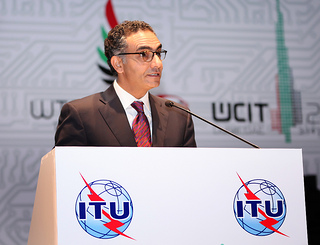This report was researched, written, and edited by Alex Laverty, Weiping Li, Renata Avila, Hisham Almiraat, Chan Myae Khine, Sarah Myers, and Rebecca MacKinnon.
The World Conference on Information Technology (WCIT) which opened in Dubai on Monday, 3 December 2012, is being hailed as ‘The Battle for Control of the Internet’, ‘The Conference to Define the Future of the Internet’, and ‘The UN Takeover of the Internet’ among other colorful headings. Officially, the meeting of the International Telecommunication Union (ITU) and the 193 member countries is to review the current International Telecommunications Regulations (ITRs) that essentially serve as the rules of digital connections and interoperability of telecommunications and satellite networks. They do not currently cover Internet protocols, resources, or governance, and there is much controversy over whether they should.

ICANN CEO Fadi Chehade speaks at the opening ceremony at WCIT 2012, courtesy of Flickr user itupictures (CC BY 2.0)
Experts from Vint Cerf to Tim Berners-Lee have weighed in on the decisions that could be made at this week’s conference. Google, joining forces with civil society from around the world, has launched a campaign to make their position clear: the ITU should keep its hands off the Internet. However Google’s agenda has been criticized by ITU Chief Hamadoun Toure, who said that Google is “abusing its power”.
Two primary concerns among netizens and civil society are that countries that deploy heavy-handed censorship and surveilance will use the opportunity to define the global rules for the Internet in a way that favors greater worldwide censorship and surveillance, and that the UN will propose it take over the domain name coordination functions of ICANN. There is also concern that telecommunications companies which have lost revenue as people replace international phone calls with email and voice chat, will try to regain lost revenue by redistributing bandwith costs to Internet companies – which Internet companies and many users will stifle innovation and make free social networking services less accessible.
News coverage on this issue has been extensive, however good articles with background on WCIT 2012 are found in The New York Times, Council on Foreign Relations, Mashable, and Wired. Also be sure to check out recent coverage of WCIT on Global Voices Advocacy, plus a great breakdown of the issues and resources by our very own Ellery Biddle.
Internet Governance
Costa Rican President Laura Chinchilla signed the Declaration of Internet Freedom in advance of the upcoming ITU meeting in Dubai. Costa Rican courts declared Internet access to be a fundamental right two years ago.
In the name of supporting innovation and keeping the cost of internet access low, Kenya will oppose broadening the mandate of the ITU at this week’s World Conference on International Telecommunications in Dubai (WCIT-12)
South Africa moved closer to hosting the administration of the .africa generic Top-Level Domain (gTLD) with Namibia formally backing the Rainbow Nation. South Africa has already passed the 60% of support that ICANN requires with 75% of African nations backing the bid.
Censorship
Internet and mobile communication in Syria was disconnected late last week, and has since been restored. AllThingsD reported the disappearance of the country’s 84 IP address blocks, detected by networking firm Renesys. It is unclear how the country was disconnected by the government, which was accused of planning a nation-wide massacre during the blackout. In the absence of connectivity the Speak2Tweet technology used by Google and Twitter to allow mobile phone users to tweet by voice during the Egypt Revolution has been reactivated for use in Syria.
In Russia, pressure has mounted on ISPs to self-censor, with the nation’s highest court ruling that ISPs risk losing their license if they fail to block what is deemed illegal content. Later in the week a Moscow court ordered Pussy Riot’s online videos be removed on the basis that they are “extremist”. Google said it would comply with the order and block the videos from view by YouTube users in Russia.
The Electronic Frontier Foundation blogged about recent events in Central Asia that suggest digital, print, and social media are under threat in the region. Reuters reports that Tajikistan has restricted access to Facebook specifically as a result of “mud and slander” posted by agents paid $5,000 to $10,000 per comment, according to Beg Zukhurov, head of the state-run communications service.
The Wall Street Journal shows how Chinese Internet users are able to circumvent The Great Firewall using a technique that doesn’t involve setting up a VPN.
Global Voices covers a Catalan newspaper that deleted the blog post of a Spanish cyber activist who had interviewed workers striking against telecom giant Telefónica. She subsequently dissociated her blog with the newspaper in order to republish her post on a personal blog. Since the story broke, the newspaper has re-posted [es] her original article to their website.
Thuggery
The commander of Iran’s cybercrimes police unit was fired on Saturday over the death of an Iranian blogger arrested by the national police. The blogger, Sattar Beheshti, died early last month while in police custody, allegedly from beatings administered by interrogators in Tehran’s Evin prison.
Sovereigns of Cyberspace
Last week we covered Facebook's proposal to change its site governance policies. The changes would affect user privacy and would also eliminate voting on future changes. Fortunately, users have one final chance to vote on the proposed changes before the right to vote is eliminated. You can do so here.
The Global Post has an article on the global ambitions of the Chinese search engine, Baidu.
Privacy
The Electronic Frontier Foundation published their 2012 E-Reader Privacy Chart. Their table shows how different e-bookstores monitor and track their customer’s actions and preferences.
A US Senate committee approved a bill that would require a warrant for law enforcement agencies to gain access to citizens’ email and cloud storage. The measure still has to pass the full Senate and House to become law, but won applause from the American Civil Liberties Union, and many other free speech and privacy groups.
National Policy
Iran introduced a biometric ID card that would be loaded with encrypted digital fingerprints and other personal information of the user. The country would require this ID card to access the Internet and would block access for all those without the card.
A Tor Exit Node Operator in Austria had his hardware seized and was charged for the distribution of child porn as a result of the police failing to understand how the technology worked.
Copyright
Verteidige Dein Netz, a Google information campaign in Germany meaning ‘Defend Your Net’, launched this week. It seeks to alert netizens to a German law that would allow publishers to charge Google for the snippets of news that appear in Google News or Google’s search results.
A user of anonymous file-sharing network Retroshare was prohibited by a German court to use the network for unknowingly passing on a copyrighted music file.
The implementation of the “six-strikes” anti-piracy system by the Center for Copyright Information (CCI), which allows ISPs to locate user accounts involved in illegal file sharing and punish copyright infringers, has been postponed until early 2013 due to Hurricane Sandy which affected the testing schedules, according CCI.
A member of IMAGiNE Group, an in-theater camcording gang, was handed a 40-month prison term, the longest sentence awarded for illegal file sharing in US.
Cybersecurity
A number of websites in Romania with .ro domains including google.ro, microsoft.ro, yahoo.ro and paypal.ro were hijacked and redirected to a rogue server by changing DNS entries. We reported similar attacks that occurred in Pakistan last week.
An allegedly Egyptian hacker with the handle TheHell is selling a cross-site scripting (XSS) vulnerability in Yahoo.com for US$700. The vulnerability allows the attacker to steal and replace tracking cookies, as well as read and send emails of Yahoo webmail users. Yahoo Director of Security has said that fixing the XSS vulnerability is easy once the offending URL is found.
Netizen Activism
Sana Saleem, a Global Voices author and executive board member of advocacy group Bolo Bhi, wrote an open letter to mainland Chinese netizens on behalf of netizens from Pakistan to appeal for solidarity against increasing censorship in Pakistan, which is reportedly aided by Chinese telcos such as ZTE and Huawei.
Julian Assange writes for the Huffington Post this week on the 2-year anniversary of the release of US State Department cables. He recaps the stories that have emerged since the Wikileaks posted classified diplomatic cables.
Cool Things
Those planning a trip to Botswana and can now scope out the country on Google’s Street View as the capital Gaborone and the national parks of Chobe and the Makgadikgadi pan were added to the mapping service.
Publications and Studies:
- Center for Information Technology Policy: No Longer Bit Players: Internet Governance & Economic Growth in Developing Countries
- Internet Society: Global Internet User Survey
Subscribe to the Netizen Report by email
For upcoming events related to the future of citizen rights in the digital age, see the Global Voices Events Calendar.




11 comments